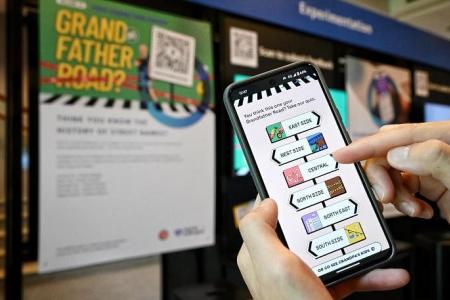Quiz on street names on display at Parliament House
Within the Marymount neighbourhood is a series of streets curiously named after the days of the week in Malay – Jalan Isnin (Monday), Jalan Rabu (Wednesday) and Jalan Khamis (Thursday).
It turns out, the streets were named during an initiative by the then Lim Yew Hock government in the 1950s to encourage people to learn the Malay language.
This piece of trivia is among those found on a quiz-based website called Grandfather Road, which is targeted at educating youth and young adults on the history behind Singapore’s streets.
Grandfather Road is part of a range of digital products developed by the Government Technology Agency (GovTech) and Open Government Products (OGP) displayed at a closed-door exhibition at Parliament House on Feb 29 and March 1.
On Feb 29, the media was invited to view tech tools that MPs can share with their constituents.
The exhibition features digital tools built by the authorities, such as an anti-scam tool to detect bogus websites, and other apps to speed up administrative tasks in government offices, and promote community engagement and assistance for the needy.
The inspiration for Grandfather Road came about when group product manager Lennard Lim became curious about interesting street names in Singapore and what they meant.
He led a group of five employees from OGP to develop the website during its annual hackathon – Hack for Public Good – which took place over the month of January.
Product designer Khaleedah Sari said the team compiled some 260 questions and trivia on locations across the island, based on sources such as author Victor R. Savage’s book Singapore Street Names and remembersingapore.org
Players can pick from six categories tied to zones in Singapore, like East Side and Central. The quiz adopts a light-hearted tone, with quirky graphics and playful comments, like “Eh you tourist ah? Why so wrong?” when a player answers incorrectly.
To Ms Khaleedah’s surprise, around 70 per cent of some 500 people who tried the quiz failed, she said.
“Singapore is young, but it has a deep and rich history,” she said. “Not a lot of people know about it, so we hope that this app can spark some curiosity about our culture.”
Other digital tools, both new and old, were showcased to members of the media and MPs such as Ms Tin Pei Ling (MacPherson SMC) and Mr Sharael Taha (Pasir Ris-Punggol GRC).
Developed by GovTech and in partnership with the police and Cyber Security Agency of Singapore, rMSE (Recursive Machine-Learning Site Evaluation) is among the programs displayed.
The software scans suspicious sites by cross-referencing key elements such as URLs and logos with authentic counterparts to identify potential scams.
Another product showcased in the section is Purple A11y, a website scanner that analyses a site for potential accessibility issues to ensure that people with special needs can independently use the Government’s digital services and other sites.
The app is open-source and open to developers to adapt.
Besides the team behind Grandfather Road, three other Hack for Public Good teams also showcased their prototypes, including Simpler, a Web browser extension that helps to paraphrase content written for adults into summaries that students can understand.
The hackathon has helped lead to the birth of products such as Pair AI in 2023, a chatbot based on ChatGPT to assist civil servants with research and writing.
Get The New Paper on your phone with the free TNP app. Download from the Apple App Store or Google Play Store now

